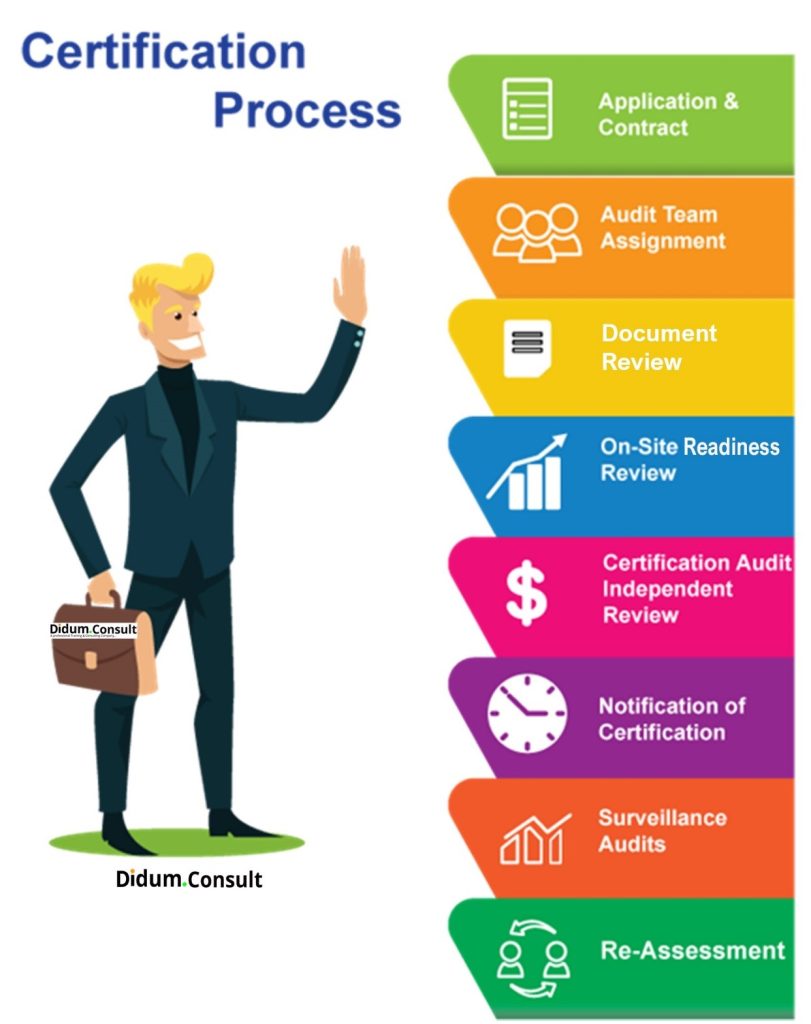Didum Consult is one of the top leading ISO Certification consulting company in Nigeria. We provide the best ISO Consulting services in Lagos, Abuja, Port Harcourt, and other major cities in Nigeria with the service of implementation, training, auditing, and registration. We provide different ISO Standards like ISO 9001, ISO 14001, and ISO 45001 respectively.
ISO is a Membership organization (1 member per state). The membership comes with rights, benefits, fantastic practice, and responsibilities. ISO has members from around 164 countries and the members of ISO will also be a part of the nation’s governmental structure or some of the members have been set up by the National Partnership of Industry Associations. With us ISO certification cost in Nigeria is minimal and we provide quality services to our customers.
Steps to Get ISO Certification

WHAT IS GAP ANALYSIS?
A Gap analysis is an objective evaluation of your organization’s current arrangements against the Standard requirements. A Gap Analysis can be an ideal place to start when implementing a new standard in your organization.
Starting with a gap analysis can be very beneficial as it often saves time and money. The gap analysis will identify the ‘gaps’, allowing you to produce a more accurate project plan for filling those gaps and achieve Certification & Set Targets.
STEPS FOR GAP ANALYSIS:
1. Documentation Review of your existing Management System and asked to provide your existing policies, procedures, and a master list of documents and records, identify missing records.
2. Visit your location(s), interviews staff, and evaluate the existing business processes through the lens of Management System.
3. Prepared a detailed report that identifies where your current practices meet to the requirements of international standard and where “gaps” exist.
4. The outcome of the Gap Analysis can then be used to develop a draft Project Plan for implementation & execution of the project.
GAP ANALYSIS REPORT
Summarize the audit findings in the form of a task list.
• Processes that comply with the standard and are documented.
• Processes that comply with the standard and must be documented.
• Processes that do not comply with the standard and must be redesigned.
• Processes required by the standard that are not currently in place.
HOW DOES A GAP ANALYSIS DIFFER FROM AN AUDIT?
The main difference between a gap analysis and an audit is that during a gap analysis your organization will compare your business to the standard. During an audit, the goal is to compare an organization’s policies and procedures to the requirements of the standard, and then look for evidence that they are being followed within the business.
STEPS TO BECOMING AN ISO-CERTIFIED BUSINESS
Develop your management system:
- Identify your core or business processes.
- Document processes with the involvement of employees.
- Review, approve and distribute the documents to those who need access to the information.
Implement your system:
- Ensure procedures are being performed as they are described in your documentation.
- Ensure employees are trained properly for the tasks they are performing.
- Create effective reporting systems to cover inspection, testing, corrective actions, preventive actions, management review meetings, monitoring of objectives, statistical techniques and so on.
- Monitor the effectiveness of your processes using measurable data, where possible.
- Review and take action to improve in the areas required.
Verify that your system is effective:
- Conduct the audit and review the processes and system for compliance and effectiveness. Observe, interview people and look at sample records.
- Identify and report strengths and weaknesses of the management system.
- Take corrective or preventive action as required.
Register your system:
- Select the appropriate auditing body for external registration.
- Submit your management system documentation for review to ensure it complies with the applicable standard.
- Prepare for review by an external auditor to confirm that the system’s requirements are being satisfied and that the management system is implemented effectively.

ISO 9001:2015 - Quality Management System
Achieve global recognition for quality with ISO 9001:2015 Certification. This internationally recognized standard helps organizations of all sizes establish a robust Quality Management System (QMS) that improves efficiency, ensures consistency, and enhances customer satisfaction.
At Didum Consult, we guide you through every stage—from gap analysis and documentation to implementation, internal audits, and certification readiness. Whether you’re seeking first-time certification or transitioning from an earlier version, our expert support ensures a smooth and successful audit. The benefits of ISO 9001 are as follows;
Improve product/service quality
Streamline internal processes
Increase customer confidence
Access new markets and contracts

ISO 14001:2015 - Environmental Management System
Strengthen your environmental performance and demonstrate your commitment to sustainability with ISO 14001:2015 Certification. This globally recognized standard helps organizations build an effective Environmental Management System (EMS) that reduces environmental risks, ensures legal compliance, and promotes responsible resource use.
At Didum Consult, we offer complete support—from environmental gap analysis and system design to training, internal audits, and certification readiness. Whether you’re a small business or a large enterprise, we tailor our approach to fit your operational needs and industry.
Improve environmental compliance
Reduce waste and operational costs
Enhance reputation with clients and regulators
Support sustainability and corporate responsibility goals
Partner with us to achieve ISO 14001 certification and lead with purpose..

ISO 45001:2018 - Occupational Health & Safety Management System
Protect your workforce and build a culture of safety with ISO 45001:2018 Certification. This international standard provides a framework for managing Occupational Health & Safety (OHS) risks, improving workplace safety, and enhancing overall employee well-being.
At Didum Consult, we support you through every step of the certification journey—from risk assessments and system implementation to employee training, internal audits, and full certification readiness. Whether you’re developing a new system or upgrading from OHSAS 18001, we help you achieve compliance with confidence.
Reduce workplace incidents and injuries
Comply with health & safety regulations
Improve employee morale and productivity
Strengthen stakeholder trust and business credibility
Create a safer, stronger workplace—partner with Didum Consult today.
We provide the best ISO certification consulting services to help companies to go through the guidelines set by the international organization for standardization (ISO) for achieving ISO certification and We always make sure that the Customers are fulfilled with our services along with the means of consulting, If You’d like to know more about our consultation methodology please do drop an email to info@didumconsult.com.